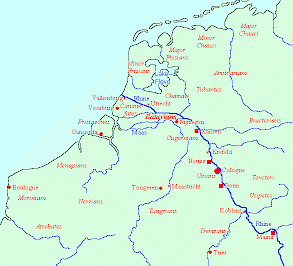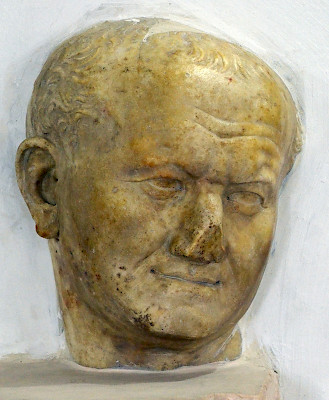Batavian Revolt (6)
Batavian revolt: the rebellion of the Batavians (a Germanic tribe) against the Romans in 69-70 CE. After initial successes by their commander Julius Civilis, the Batavians were ultimately defeated by the Roman general Quintus Petillius Cerialis.
The Roman Counter-Attack

The legions Fifth Alaudae and Fifteenth Primigenia were besieged in Xanten. Marcus Hordeonius Flaccus, less indolent than Tacitus wants us to believe, had already taken counter-measures. Pickets were posted along the Rhine to prevent the Germans from entering the empire. He ordered the Fourth Legion Macedonica to stay at Mainz, which had to be kept at all costs. Messengers were sent to Gaul, Hispania, and Britain, requesting for reinforcements. (As we will see, Basque units were to save the day during a battle near Krefeld.) The Twenty-Second Legion Primigenia, commanded by Gaius Dillius Vocula, marched at top speed to Novaesium or Neuss in the north; Flaccus himself went to the First Legion Germanica at Bonn, traveling on board of a naval squadron because he suffered from gout.
Tacitus tells us that at Bonn, the general found it difficult to take authoritative action. The soldiers held him responsible for the free passage of the eight Batavian auxiliary units. However, he convinced the First legion to follow him, and together with Vocula's legion, he joined forces with the Sixteenth Legion Gallica at Neuss. They continued to Gelduba, modern Krefeld.
And then, suddenly, the advance halted. Tacitus offers all kinds of reasons for the delay: the soldiers had to receive additional training, the Cugerni (a tribe inside the empire that had sided with Civilis) had to be punished, they had to fight with enemies for the possession of a heavily-laden corn-ship... The real reason, however, was that news had arrived from the south: by now, Vespasian's legions were invading Italy.
It may be remembered that the army of the Rhine had fought for Nero against Gaius Julius Vindex in 68; nonetheless, Vindex' friend Galba had become emperor, and he had been suspicious of the Rhine army. Flaccus and Vocula wanted to prevent that this history would repeat itself. Suppose that they defeated Civilis, who claimed to fight for Vespasian, and suppose that he defeated Vitellius... This was an unacceptable risk.

In the first days of November, the soldiers received bad news: their emperor Vitellius and his army - which was made up from units from the Rhine - had been defeated. Those at Krefeld personally knew many of the dead. This did little to improve the morale, especially since it was clear that Vitellius could no longer win the civil war. The officers decided that they had to side with Vespasian.
When Hordeonius Flaccus administered the oath of allegiance, the rank-and-file accepted it under pressure from the officers, though with little conviction in their looks or hearts, and while firmly reciting the other formulae of the solemn declaration, hesitated at the name "Vespasian" or mumbled it, and indeed for the most passed it over in silence.note
Again, Flaccus and Vocula were forced to wait. They did not know what to do, Julius Civilis had to take the initiative. If he had truly been an adherent of Vespasian, the war was now over, because the legions of the Rhine army had sided with this emperor. If, on the other hand, his use of the letter from Vespasian had been nothing but a masquerade, the war had to continue, and the Romans would have to fight with the bravest of all neighboring tribes. Slowly, the days passed on, and nothing happened. No messengers arrived from the north, and Flaccus understood that the Batavian wanted to continue the struggle.
Civilis knew that he had to destroy the army at Krefeld before it had united with the besieged. He knew that, after the attack on Xanten, the Romans would retaliate, but it would cost half a year before they could sent an army across the Alps - the winter was approaching - and if he had destroyed the army at Krefeld, he could take Xanten and enlarge the rebellious region. He was already negotiating with the Trevirans, who would certainly side with him if the most northerly position of the Roman forces were Mainz, which would fall if the Batavians and Trevirans cooperated. However, Civilis was confronted with with one problem: the army of Flaccus and Vocula, even though it consisted of three depleted legions, was too large to face in a regular battle.
Flaccus and Vocula did not have to be clairvoyants to know that the Batavian leader would try to catch them off-guard. And they could also forecast that he would do this on a moonless night, like the night of December 1/2, 69. Tacitus, however, wants us to believe that the attack of the eight Batavian auxiliary units came unexpectedly.
Vocula was unable to address his men or deploy them in line of battle. All he could do when the alarm sounded was to urge them to form a central core of legionaries, around which the auxiliaries were clustered in a ragged array. The cavalry charged, but were brought up short by the disciplined ranks of the enemy and forced back upon their fellows. What followed was a massacre, not a battle. The Nervian auxiliary units, too, were induced by panic or treachery to expose the Roman flanks. Thus the attack penetrated to the legions. They lost their standards, retreated within the rampart, and were already suffering heavy losses there, when fresh help suddenly altered the luck of the battle.
Some Basque auxiliary units [...] had been summoned to the Rhineland. As they neared the camp, they heard the shouts of men fighting. While the enemy's attention was elsewhere, they charged them from the rear and caused a widespread panic out of proportion to their numbers. It was thought that the main army had arrived, either from Neuss or from Mainz. This misconception gave the Romans new heart: confident in the strength of others, they regained their own. The pick of the Batavian fighters - at least so far as the infantry was concerned - lay dead upon the field; the cavalry got away with the standards and prisoners taken in the first phase of the engagement. In this day's work casualties in slain were heavier on our side, but consisted of poorer fighters, whereas the Batavians lost their very best.note
Again, Tacitus' description is misleading to the extreme. Of course the Basque units did not arrive by accident, as Tacitus seems to imply. They were sent by Flaccus. Likewise, the suggestion that the Nervians "betrayed" the Romans, is a marvelous example of Tacitean innuendo.
The battle of Krefeld was an important Roman victory, although the losses were severe. This is corroborated by a macabre archaeological discovery: many dead people and horses did not receive a decent cremation, but were hurriedly buried in a large mass grave.
The consequences of the battle were enormous. The eight Batavian auxiliary units now disappear from Tacitus' narrative, although he uses the expression cohortes once in a non-technical sense.note Civilis had shown his true intentions and lost his best men, and nothing withheld the Romans from marching on Xanten and lifting the siege.
The camp's walls were strengthened, the ditches deepened, supplies brought in, the wounded taken away. But there was no opportunity to invade the country of the Batavians and retaliate, because bad news arrived from the south: the Usipetes and Chattians, tribes from the east bank of the Rhine, had crossed the river, were plundering the country and tried to besiege Mainz. It did not seem very serious, but it was prudent not to take any risks. After all, Mainz was more important than Xanten.
Therefore, the expeditionary force, strengthened with 1,000 soldiers from Xanten, returned. Immediately, Civilis renewed the siege of an undergarrisoned but better equipped Xanten. When his cavalry attacked the retreating army near Neuss, however, they were soundly defeated.
The legionaries had shown their worth at Krefeld and Xanten, and when they reached Neuss, there was a pleasant surprise: Flaccus distributed money to celebrate the accession of Vespasian. As loyal adherents of Vitellius, this was more than the soldiers had expected. These were the days of the Roman carnival, the Saturnalia, and the legionaries celebrated it with pleasure. It must have come as some sort of release after the tensions of the preceding weeks. However, the merrymaking was disturbed.
In a wild riot of pleasure, feasting and seditious gatherings at night, their old enmity for Hordeonius Flaccus revived, and as none of the officers dared to resist a movement which darkness had robbed of its last vestige of restraint, the troops dragged him out of bed and murdered him.note
The same would have happened to Vocula if he had not been able to make his escape from the camp, dressed as a slave. The assault on the two commanders at the moment when Fortune was smiling at the Romans, is one of the unexplained events during the Batavian revolt.
We can only speculate about the reason. As we have already seen, the Roman expeditionary force had returned to the south and had taken men from Xanten with them. Tacitus mentions that those that were left behind felt themselves betrayed, and understandably so: they were to keep the defeated Batavians occupied while the main force was occupied somewhere else. Is it possible that the murder was not an act of drunken hysteria, but "fragging", i.e., the killing of a commander who was careless with soldier's lives?